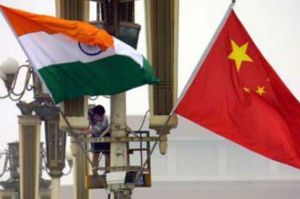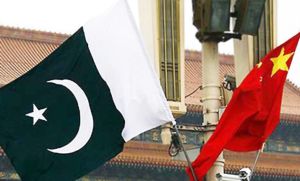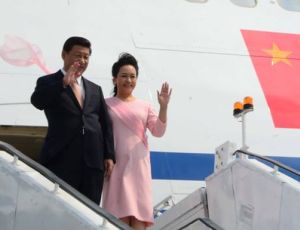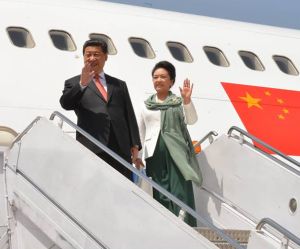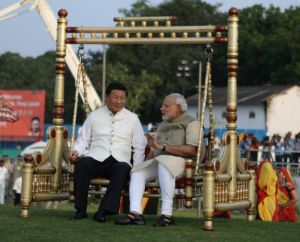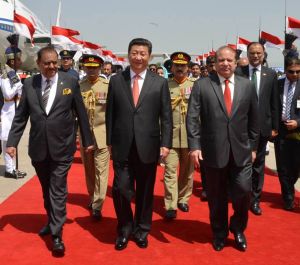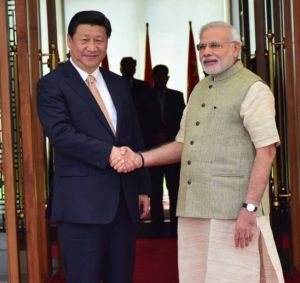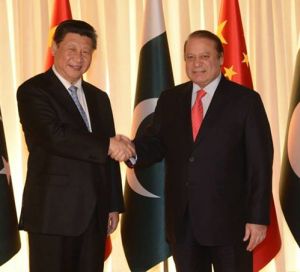|
|
|
|
|
|
Ahead of Xi's India visit
- Modi irked Beijing when in Japan he indirectly referred to China's expansionist mind-set. He said: "Everywhere around us, we see an 18th century expansionist mind-set: encroaching on other countries, intruding in others' waters, invading other countries and capturing territory."
|
|
Ahead of Xi's Pakistan visit
- Islamabad made all the right noises before Xi's arrival. Refusing to call Xi's earlier cancellation of a trip a snub, Sharif said the Chinese president's visit would usher in a new era of development in Pakistan and start a new chapter in the friendship between the two countries
|
|
|
|
What Xi said before reaching India
- Xi restrained himself, simply asserting his desire to reach out to the new administration in New Delhi.
In an editorial in The Hindu, he said: 'As two important forces in a world that moves towards multipolarity, we need to become global partners having strategic coordination. The combination of the "world's factory" and the "world's back office" will produce the most competitive production base and the most attractive consumer market.'
|
|
What Xi said before reaching Pakistan
- Raising the Pak-China Dosti Zindabad slogan, Xi termed his trip as 'a visit to his own brother's home'.
In an editorial before his trip, he said: 'When I was young, I heard many touching stories about Pakistan and the friendship between our two countries. To name just a few, I learned that the Pakistani people were working hard to build their beautiful country, and that Pakistan opened an air corridor for China to reach out to the world and supported China in restoring its lawful seat in the United Nations. The stories have left me with a deep impression.'
|
|
|
|
|
|
|
In India
- Breaking away from protocol, Modi unrolled a grand welcome for the Chinese president in Ahmedabad and then took him on a whirlwind business-cum-leisure trip, topped by a lavish Gujarati vegetarian dinner on the picturesque Sabarmati river front.
- Next day, Modi and Xi flew to Delhi for summit talks after which both nations inked 16 agreements on railways, trade, administration, culture and industrial parks.
- The Chinese side promised to invest US$ 20 billion in India in the next 5 years in various industrial and infrastructure development projects.
|
|
In Pakistan
- Xi was greeted by a host of dignitaries at the Nur Khan base in Islamabad, including Pakistan's President Mamnoon Hussain, Prime Minister Nawaz Sharif and army chief Raheel Sharif.
- The two sides finalised agreements on $28 billion of advance projects out of the total $46 billion, ranging from upgrading Pakistan's railways to building power plants.
- 51 agreements were inked following the Sharif-Jinping talks.
- Xi addressed a special joint sitting of both houses of Pakistan's parliament.
|
|
|
|
|
|
|
What China and India agreed to do
- Mumbai and Shanghai will be twin cities. A new road to Kailash Mansarovar via Nathu La.
- Initiation of a civil nuclear energy dialogue.
- Conducting the fourth round of joint army exercises and discussing the prospect of joint naval/Air Force training in due time and expand cooperation in areas falling under peace-time military operations.
- Reiterating significance of special representatives-level talks and the need to maintain peace and tranquillity along the Sino-India border.
|
|
What China and Pakistan agreed to do
- Facilitating important cooperation projects as well as a number of energy, infrastructure and power generation projects.
- Enhancing maritime cooperation, bringing into full play the Pakistan-China Maritime cooperation dialogue mechanism, strengthening policy dialogue and strategic communication on maritime issues.
- Actively promoting 2012-2020 Space Cooperation Outline between China National Space Administration and Pakistan Space and Upper Atmosphere Research Commission.
- Enhancing defence cooperation, maintaining high-level visits and exchanges at various levels between relevant departments of the two armed forces, making full use of the Pakistan-China Defence and Security Consultation mechanism.
- Strengthen cooperation on Afghanistan, support the "Afghan-owned and Afghan-led" peace and reconciliation process.
|
